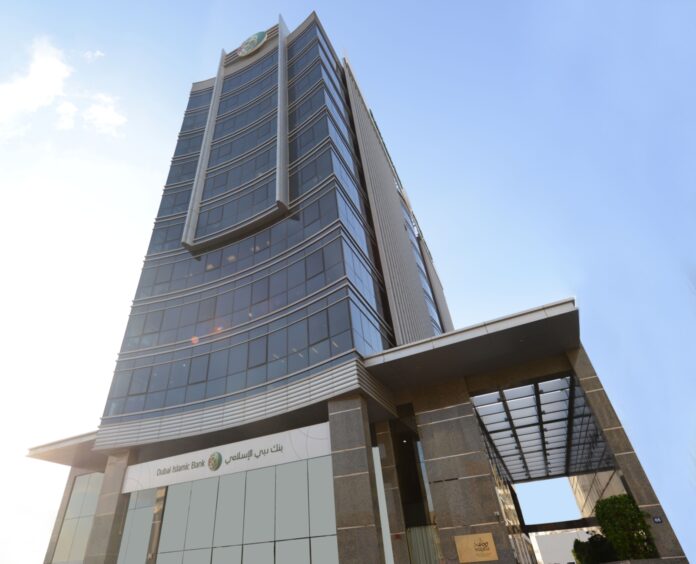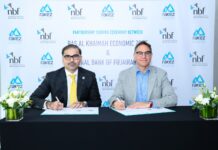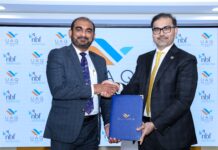Dubai Islamic Bank announced its results for the period ending December 31, 2022.
FY 2022 Highlights:
- Substantial growth in Group Net Profit of 26% YoY to AED 5,552 million vs AED 4,406 million in same period last year. The strong growth was driven by rising core revenues, prudent cost management and sustained lower impairments.
- Net financing and sukuk investments grew by 5% YoY to AED 238 billion. The bank attained nearly AED 63 billion in annual gross new underwriting and sukuk vs AED 50 billion in FY2021.
- Total income reached to AED 14,101 million compared to AED 11,795 million, double digit growth of 20% YoY and 17% QoQ.
- Net Operating Revenues showed a robust 11% YoY increase and 8% QoQ to reach AED 10,467 million.
- Net Operating Profit now at AED 7,734 million, a strong increase of 12% YoY and 10% QoQ, compared to AED 6,892 million in FY 2021.
- Balance sheet expanded by 3% YoY to AED 288 billion.
- Customer deposits now at AED 199 billion with CASA comprising 44% (+225bps QoQ) of the deposit base. Customer deposits were up 7% QoQ, primarily due to a 12% increase in CASA.
- Impairment charges continue to decline registering AED 2,103 million against AED 2,448 million in previous year, lower by 14% YoY, demonstrating resilience of the financing book.
- NPF ratio continues its downward momentum now at 6.5% lower by 30 bps YoY compared to 6.8% in FY 2021.
- Cost to income further improved to 26.1%, down 70 bps YoY.
- Liquidity remains healthy with LCR of 150%.
- Continued improvement on ROA now at 2.0% (+47bps YoY) and ROTE at 17% (+400bps YoY).
- Capitalization levels remain robust with CET1 at 12.9% (+50bps YoY) and CAR at 17.6% (+50bps YoY), both well above the minimum regulatory requirement. Total equity now stands at AED 44 billion.
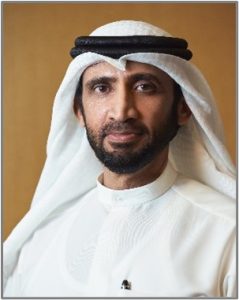
- The UAE continued to attain economic growth and expansion amidst a turbulent year withstanding the impact of geo political conflicts and higher global inflation depicting its robust financial and monetary policies, strong domestic recovery and fiscal surpluses. These robust economic policies have strengthened the banking sector and supported the growth of the domestic financial markets which have exhibited higher trading activities and increased foreign inflows.
- DIB attained its strongest year in its history with robust growth in profitability as total income reached AED 14 billion, a 20% YoY growth and balance sheet now at AED 288 billion witnessing a 5-year CAGR of 7%.
- In light of the Group’s strong performance, we are pleased to proposed a 30% dividend to our valued shareholders who have placed their trust and confidence in the Board and Management.
- We thank all our shareholders for their support and remain committed to delivering performance and returns aligned with the expectations they have from the bank.
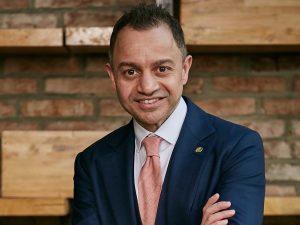
- Dubai Islamic Bank posted spectacular annual profitability during FY2022 amounting to AED5.6 billion, the highest ever net income in our bank’s history. This beat depicts our robust strategy and the management’s efforts and commitment to enhancing shareholders value.
- Core banking profitability metrics and ratios were also solid with net operating revenue up 11% YoY due to a robust balance sheet structure. Return ratios followed suit with at ROA 2.0% (+47 bps YoY) and RoTE 17% (+400 bps YoY) surpassing our full year guidance and exhibiting the bank’s agility to remain on track despite the on-going subdued global economic environment.
- Given the rate environment and surplus liquidity, we made a deliberate tactical move focused on quality and structural sourcing rather than growth only. This led us to support large corporate and public sector entities in adjusting and aligning their balance sheet in the new medium-term environment; a winning combination for customers, bank and economy.
- Despite the above tactical move, liquidity remains solid primarily through deepened relationship with the government, public and large corporates. This current liquidity profile provides us with the impetus for growth in 2023.
- We continue to maintain firm control on expenses leading us to deliver to the best cost to income ratio in the market at 26.1% while maintaining head room to elevate the bank’s system upgrades.
- The year saw some landmark achievements on our sustainability journey with the successful launch of our sustainable finance framework followed by an inaugural issuance of our USD 750 million sustainable sukuk. The above two firsts for DIB and the region showcase the beginning of an incredible journey to transform the bank into a leading sustainable financial institution aligned to our ambition of owning the ESG space
Operating Performance
The bank’s total income rose to AED 14,101 million in FY 2022 demonstrating a healthy YoY growth of 20% compared to AED 11,795 million primarily driven by strong income from financing assets. This is clearly reflected in the Net Operating Revenue which grew by 11% YoY to reach to AED 10,467 million compared to AED 9,442 million last year.
Pre-impairment profit during FY 2022 increased by 12% YoY reaching to AED 7,734 million compared to AED 6,892 million. Underwriting quality remains robust resulting in sustained lower impairment charges amounting to AED 2,103 million vs AED 2,448 million last year, an improvement of 14% YoY.
Operating expenses amounted to AED 2,733 million during FY 2022 vs AED 2,529 million in FY 2021 exhibiting an 8% YoY increase. The bank focused on enhancing support functions embarking on numerous projects related to system upgrades across all business segments to further boost agility whilst also aligning to the evolving regulatory requirements. Following higher revenue growth, cost income ratio further strengthened ensuring, once again, a sector leading position at 26.1%.
As a result, the bank’s Group Net Profit witnessed a substantial rise of 26% YoY to reach AED 5,552 million vs AED 4,406 million in FY 2021.
Net profit margin increased to 3.0% (+40bps YoY) with ROA and ROTE at a healthy 2% and 17% up by 47 bps and 400 bps respectively.
Balance Sheet Trends
Net financing & Sukuk investments stood at AED 238 billion, a rise of 5.0% YoY from AED 228 billion in FY 2021. Sukuk investments, another key focus of the bank, grew at a sturdy 25% YoY to reach to AED 52 billion.
DIB witnessed overall YoY growth in gross new financing and sukuk in FY 2022 amounting to nearly AED 63 billion, up 26% compared to FY 2021. Gross corporate financing origination of nearly AED 31 billion (+ 40% YoY) driven mainly by government related entities, while new bookings from consumer financing accounted for AED 18 billion (+29% YoY), exhibiting DIB’s competence in deploying financing assets despite the ongoing market volatilities. Whilst routine repayments of AED 14 billion and AED 15 billion from the corporate and consumer segments respectively were incorporated within the growth plans for 2022, excess liquidity and current high rate environment led to large early settlements and prepayments of over AED 21 billion which came through the corporate portfolio has significantly impacted the net growth numbers.
Customer deposits stood at AED 199 billion at year end, down 3.5% YoY, with CASA now standing at AED 87 billion, comfortably placed at 44% of deposits. On a QoQ basis, DIB has managed to increase its deposits during FY2022 by 7% vs 9M 2022, driven by a 12% increase in CASA deposits mainly through DIB’s corporate funding base, underpinning the bank’s efficient funding and solid market position. Liquidity coverage ratio (LCR) at 150%, up from 136% FY 2021, remains above regulatory requirement, depicting strong liquidity position.
During 4Q 2022, DIB further enhanced its funding base by issuing USD750 million of sustainable sukuk, the first from a financial institution in UAE and the largest from the GCC region since March 2022.
Credit quality improved during the year with non-performing financing (NPF) ratio seeing a decline of 30bps YoY to 6.5%. NPF has now declined by a healthy 6% YoY to AED 12,986 million from AED 13,784 million in FY2021. The main improvement came from DIB’s core NPF portfolio which improved by 4% while NMC and NOOR POCI (which constitute 17% of NPFs) both declined by a combined 14%, due to ongoing recoveries. Stage 3 coverage accordingly improved to 61%, (+450 bps) from FY2021. Additionally, asset quality improvement has been depicted across the Stage 2 account on a YoY basis and sequentially. Stage 2 financing dropped to AED 16 billion YoY, a 21% drop and also down 6% vs 9M 2022 depicting improving quality of the book. Moreover, Stage 2 coverage also improved to 7.5% compared to 5.6% in FY2021 and 6.9% vs 9M2022.
Cash coverage ratio improved to 78% (+600 bps YoY, +200 bps vs 9M2022) and overall coverage including collateral at 110% (+779bps YoY) underpinning DIB’s overall cautious approach to underwriting. Cost of risk on gross financing assets now stands at 84 bps compared to 99 bps for the year 2021, an improvement of 15 bps YoY.
Capital ratios continue to remain strong with CAR now at 17.6% and CET 1 ratio at 12.9%, both well above the regulatory requirement.
Business Performance (FY 2022)
Consumer Banking portfolio stood at AED 53 billion up 5% from AED 51 billion in FY 2021. The portfolio’s total new underwriting of AED 18 billion during FY 2022 is up 29% YoY mainly driven by Personal and Home Finance accounts. The portfolio expanded by net AED 2.7 billion, underpinning the bank’s solid retail franchise. The segment is also actively deploying financing in the SME sector. The business generated AED 4 billion in revenues during the year up 14% YoY from AED 3.6 billion during FY 2021. Blended yield on consumer financing grew by 36 bps YoY to reach to 5.96%.
Corporate banking portfolio now stands at AED 142 billion with government and service sectors contributing 33% to this portfolio. New wholesale lending for FY 2022 registered AED 31 billion up by a substantial 40% YoY from AED 22 billion last year driven mainly by government related entities (GREs). This growth has been offset by repayments and early settlements in the tune of AED 35 billion for the full year, nearly 60% of which were early pre-settlements. Revenues grew strongly to reach to AED 3.7 billion, up 20% YoY compared to AED 3.1 billion in FY2021. Yield on corporate financing portfolio continues its upward trend now reaching 3.9%, an increase of 112 bps YoY.
Key Business Highlights
- Dubai Islamic Bank is the first Islamic bank in the UAE to publish its Sustainable Finance Framework, which was created to facilitate the financing of green and social projects. The Bank has already launched a number of innovative sustainable finance offerings, like green auto finance and affordable housing in the UAE. However, the framework allows DIB to accelerate these efforts by permitting the Bank to raise sustainable financing across multiple formats in the future. Under the framework, DIB will finance projects with environmental benefits in eligible project categories such as renewable energy, energy efficiency, clean transportation, green buildings, pollution prevention and control and sustainable water and wastewater management, as well as supporting social initiatives that promote employment generation, affordable housing and access to essential services. Concurrently, this supports DIB’s commitment to driving sustainability by financing companies and projects that are at the forefront of the energy transition in the UAE.
- Under DIB’s Sustainable Finance Framework and along the bank’s corporate sustainability strategy, Dubai Islamic Bank successfully issued its inaugural USD 750 million Sustainable Sukuk which was created to facilitate financing of green and social initiatives and projects. The sukuk was successfully 2.3x oversubscribed and the deal is the first-ever Sustainable Sukuk from a UAE Financial Institution.
- Dubai Islamic Bank has partnered with Al Ramz, a leading UAE capital markets financial institution providing a wide spectrum of financial solutions in order to leverage capital markets services and expand financial offerings to customers. The partnership will allow DIB to provide brokerage and related services to its clients through Al Ramz Capital, where the bank will also offer its banking services to their customers as part of this arrangement. This partnership will enable customers to access a wide range of securities solutions in local, regional and international markets.

